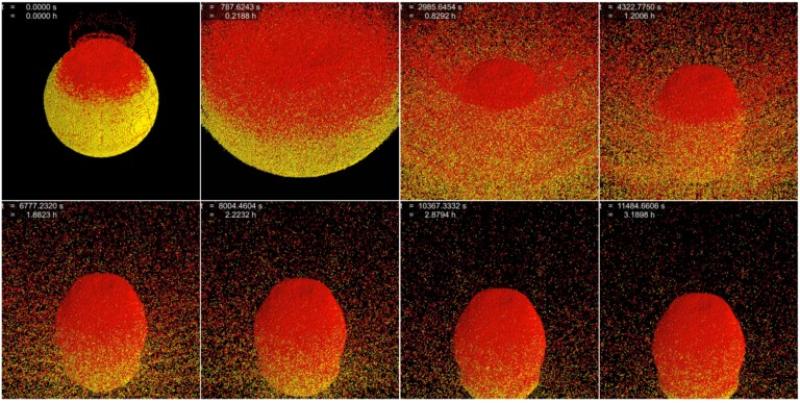Why saving Earth from a rogue asteroid might be harder than we thought



If humanity ever truly felt our existence threatened by an asteroid , one potential recourse would be to smash the looming space rock into pieces — but new research suggests that that approach may be less likely to succeed than people hope.
The research suggests that an asteroid wouldn't break apart as drastically as previous models suggested, and that in the aftermath of the attempted destruction, the asteroid's gravity would be strong enough to pull the fragments back together.
"It may sound like science fiction but a great deal of research considers asteroid collisions," lead author Charles El Mir, a recent doctoral graduate at Johns Hopkins University, said in a university statement . "For example, if there's an asteroid coming at Earth, are we better off breaking it into small pieces, or nudging it to go a different direction? And if the latter, how much force should we hit it with to move it away without causing it to break? These are actual questions under consideration."
Answering those questions, unsurprisingly, would be easier if we knew more about asteroids — the authors wrote that even when it comes to asteroids that scientists have density estimates for, they typically aren't sure what their interior structure is. Nevertheless, simulations let them model asteroids with a broad range.
The results bode well for asteroids, at least. "We used to believe that the larger the object, the more easily it would break, because bigger objects are more likely to have flaws," El Mir said. "Our findings, however, show that asteroids are stronger than we used to think and require more energy to be completely shattered."
Of course, asteroids aren't just potential threats — they also intrigue scientists because they are leftover rubble from the formation of the solar system, and some hope that they could become resources for companies seeking to mine their water and metals.
The research is described in a paper published in the March issue of the journal Icarus.




Just when you think you have a great idea.... oppps!
No problem, just send Robert Duvall up in a rocket loaded with hydrogen bombs.
Oh, well....back to the drawing board
Using tools to alter the orbit of space rocks (asteroids) so they don't collide with us seems the best among known alternatives, if it works.
Perhaps experiments with asteroids not on the way to collide with us can teach us which method will best work.
Charge the cost to my credit card.
Master-Roid. Its everywhere you want to be.
Enoch.
Assuming we have a good detection system, that is where my money is.
Certainly, not on my credit card either.
LOL.
Good One!
(And a good point).
E.
If they believe we can shatter an asteroid like they show in the simulation, even if it recollects itself it is no longer a solid rock when it hits the earth. It would be like getting hit by a snow ball instead of a rock.
A very hard snowball...more like an iceball. Ever make those as a kid?
An object shattered that much when coming into the influence of a much larger gravitational force, such as the earth, the gravitation will rip it apart before it even enters the atmosphere, so it would be more like a shot gun than a nuclear bomb. Think about the comet that went past Jupiter a few years ago and how the gravitation of Jupiter ripped it apart before it finally entered Jupiter's atmosphere.